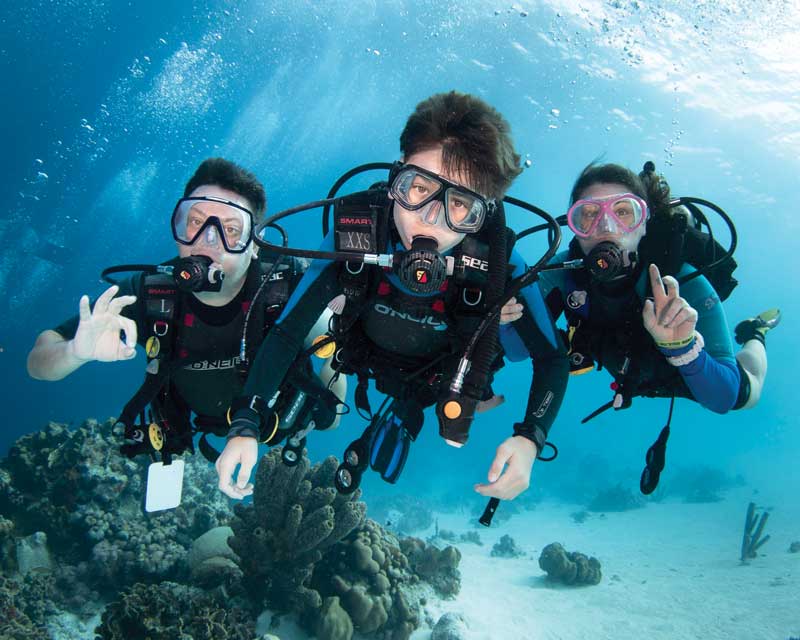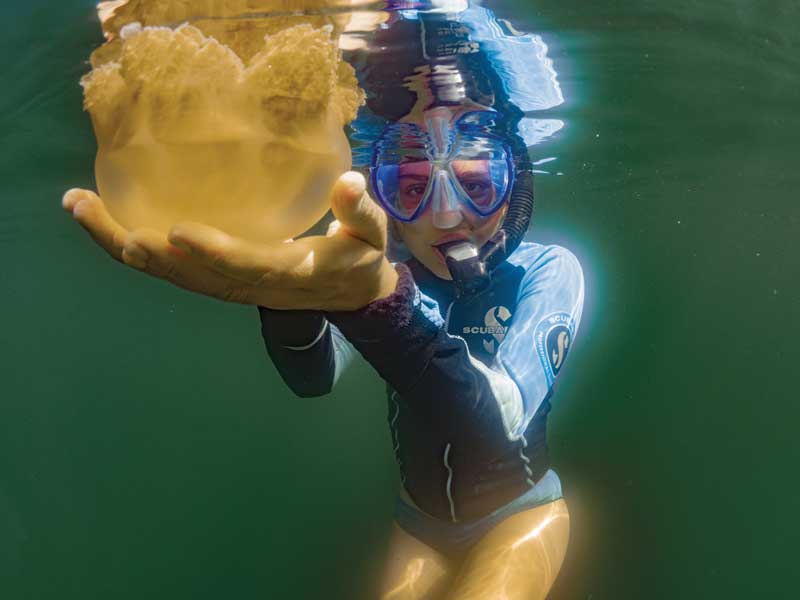Addressing and alleviating fears
By Margo Peyton

As a dive instructor specializing in teaching children, I’ve encountered many situations where kids are keen to go diving, but have certain fears. Here are some of my tips on how to address those fears and resolve the problems so little ones can enjoy diving.
Ears
Blowing gently while pinching your nose is only one option. If it’s not working for your child, you can let them know there are other ways to equalize. You can look up while stretching and wiggling the lower jaw and even swallowing can work to alleviate ear pressure, just like kids do on an airplane. Some kids do not realize that they only need to equalize ears when descending, and it’s not needed while ascending.
Constantly worrying or overthinking about your ears can cause anxiety and stress, which can also contribute to not being able to equalize. Encourage them to relax and take their time. If those things don’t work, then get your child checked out by an ENT (Ear, Nose and Throat Specialist). Some kids have shorter or underdeveloped eustachian tubes or so it might just be a matter of time.
Sharks
Mostly due to shark week, news stories, and movies about shark attacks, this is one of the biggest fears. Not one child I have ever spoken to has known personally anyone who was killed by a shark, but that is the fear. It’s real and it needs to be addressed like any other fear. First I point out how few people have been killed by sharks, and how rare the conditions were for those incidences to have happened. I add that I have over 6,000 dives and never been bitten or attacked by a shark. I spend 24 weeks a year in the ocean. I educate with facts and then show some amazing video of my friend Christina Zenato the Shark Dentist and tell everyone how they are like puppy dogs with her. To date, I have put over 4,000 kids in the water with sharks in Palau, Galapagos, Yap, Philippines, Belize, Bahamas, Costa Rica, Socorro, and the Sea of Cortez and all of those kids no longer have a fear of sharks, only love and respect. My own daughter and husband were terrified to dive anywhere they could possibly encounter a shark, all due to TV and movies! Unfortunately, it takes experiencing sharks in a safe and educational way with experienced dive teams for those fears to be completely removed. Until that time, you can advise your kids that it’s actually pretty rare to see sharks on dives, unless you’re specifically going on a shark dive. Your best tool is education. I highly recommend looking up Christina Zenato.
Gear
Some kids have anxiety about breathing underwater and claim they have difficulty breathing through their reg. Remember: not all regulators breathe the same. Rental regs can breathe pretty hard. So, if your child says they think it’s hard to breathe through their reg, test it. That reg may need servicing or it just may be a low-quality rental reg. Personally, I feel kids should have their own regulators. It’s not an item they can outgrow and with good care will last many years. Buy them a good quality regulator system with an airflow they can control and increase to their own comfort level. It may make the difference in them continuing to dive or not.
Likewise, not all masks are created equal. Kids have tiny faces, but as they grow quickly don’t assume the mask they had at 10 still fits at 14. Silicone can become hard and crack or leak from age. If your mask leaks or doesn’t fit or gives you a headache, you’re not going to want to dive. Listen to your kids when they tell you gear does not feel comfortable or is not working. Kids grow fast and gear should be updated and serviced and working properly. It’s also important to commend them for noticing and addressing the issue.
Seasickness
Some kids are afraid to go out in a boat and become seasick. Younger kids should only go out in calm seas so make sure to check the wind and currents and weather conditions. Seasick medication can be very helpful as well. Address the issue, and then have a discussion about it. Make sure to not go diving on a full stomach and for sure no greasy, fatty foods prior to diving. Always check with your doctor on any medications, because some are affected by motion.

Jellyfish
It’s always a toss-up when I’m talking to or teaching kids if sharks or jellyfish as the biggest fear they have.
Oftentimes children have had prior run-ins with jellyfish and had bad stings, which have left them with a fear of encountering jellies. I actually include myself in that group! But there are many ways we can enjoy our dives without getting harmed by jellyfish. Being educated about them and ready for them isn’t difficult. Waterproof Sea Safe sunblock creates a skin barrier against jellyfish while, of course, serving as a sunblock. Long sleeve rash guards and full wet suits also make good barriers.
It’s a great idea to ask the local dive experts about the jellyfish migrations and common types in areas that you and your child are diving. Some kids are highly reactive to jellyfish stings. Their fear is real, and I never make light of it. I make sure to ask those questions to the local staff. If they are known to be around, I suggest avoiding night dives, as jellyfish can be attracted to diver lights. Most jellyfish hang from zero to ten feet (zero to 3m) from the surface so you will mainly encounter them when you jump in and when you get out. So I use my octopus to blow them away from the ladder when I’m getting out. I am observant of the water right in front of me and above me and I always carry a set of epi-pens and Benadryl, just in case they are not available on location.
I Don’t Know What’s Wrong
The fear could be something you never thought of or even knew existed. Listen to what your kids are telling you and treat their comments at face value. I once had a student who was very keen but said he had pressure on his face like something was crawling on his skin, but no pain. I felt sure what he was feeling was real, and sure enough, it turned out that he was experiencing air being released through his tear ducts. He had to go see an ENT to resolve the issue and now enjoys diving like all other kids.
In my twenty years of diving with kids, I have addressed many fears and 98% of them we were able to overcome. Some take time and others take education, facts, and good preventative planning. For the most part, kids are really fearless and with encouragement and acknowledgment, they are willing to move past fears and have fun.
Don’t give up.
Margo Peyton is the founder of Kids Sea Camp and Family Dive Adventures, recipient of the DEMA Reaching Out Award, Woman Divers Hall of Famer, and the PADI Award of Excellence in training and education with over 6,000 certified kids and zero dive accidents! For more: www.familydivers.com







